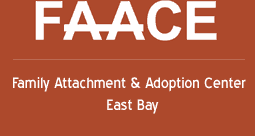Evaluation Process

 At the Family Attachment and Adoption Center East Bay, we always conduct a thorough evaluation before we begin treatment. At the Family Attachment and Adoption Center East Bay, we always conduct a thorough evaluation before we begin treatment.
 We assess for behavioral problems, mental health conditions, attachment, adoption and parenting difficulties. We assess for behavioral problems, mental health conditions, attachment, adoption and parenting difficulties.
 We screen and make referrals for sensory-integration, cognitive, learning and neuropsychological and neurodevelopmental issues. We screen and make referrals for sensory-integration, cognitive, learning and neuropsychological and neurodevelopmental issues.
Children with histories of maltreatment, neglect, institutional care, prenatal drug or alcohol exposure, multiple moves or early painful medical histories may be experiencing complex post-traumatic stress disorder. These children can have a variety of challenges and difficulties in a number of domains.
Developing an effective treatment program requires thorough evaluation of the child’s and family’s strengths and weaknesses, their attachment styles and the parent’s ability to manage the child’s challenges in a reflective manner. Problem behaviors and symptoms can stem from many different causes. Effective treatment is treatment that is directed at the cause of the symptom not just the surface behavior.
The evaluation process begins with a meeting with the child’s primary caregivers. In this meeting, we review the child’s history, previous treatments, and the child’s functioning in various settings, including school, with peers, at home, with other caregivers, in the community, behaviorally, emotionally, developmentally, and cognitively.
During this session we also begin to assess the family’s ability to parent and manage the child’s difficulties in a stable, and secure way. We review copies (or obtain releases to get copies) of the child’s past evaluations, school records, previous treatment records, and other relevant documents such as child protective service reports, social histories, adoption summaries, and foster care reports.
We may use some psychological screening tests that we have parents, the child or teachers complete. These can include:
|
We next meet with the child for one or more sessions for a clinical interview. Depending on the age of the child, this may include observation of the parents and child interacting in a task to assist in assessing the relationship between parents and child.
The next meeting is with the parents to review the results of our assessment and discuss diagnoses, present our recommendations, and to discuss treatment options. During this interview we may make referrals to other professionals (such as sensory integration therapists, neuropsychologists, developmental pediatricians, psychiatrists, learning specialists, neurofeedback specialists, developmental optometrists, audiologists, etc.) for further evaluations or treatment.
We discuss recommendations regarding treatment so parents can determine if they wish to pursue treatment with us.
These meetings usually occur over 3 to 4 weeks, but when families come from outside of the Bay Area we can complete our evaluation in a half-day meeting with the family completing the various tests and questionnaires ahead of time and mailing this material to us a week prior to the session.

|




